Commercial and Corporation Law: Shareholder Rights and Dividends
VerifiedAdded on 2019/11/14
|7
|1540
|189
Report
AI Summary
This report analyzes a case study involving a commercial and corporation law dispute. It examines the rights of shareholders concerning dividend payments, particularly in relation to the Corporations Act 2001. The report discusses the board of directors' decisions regarding dividend distribution and the legal implications of withholding dividends to fund organic vineyard development. Furthermore, it explores share buyback processes and the reduction of capital, considering the interests of A class shareholders and the legal procedures required. The analysis covers relevant sections of the Corporations Act, including those related to directors' duties and shareholder rights. The report concludes with a discussion of the potential legal actions and the steps necessary to comply with corporate law regulations.
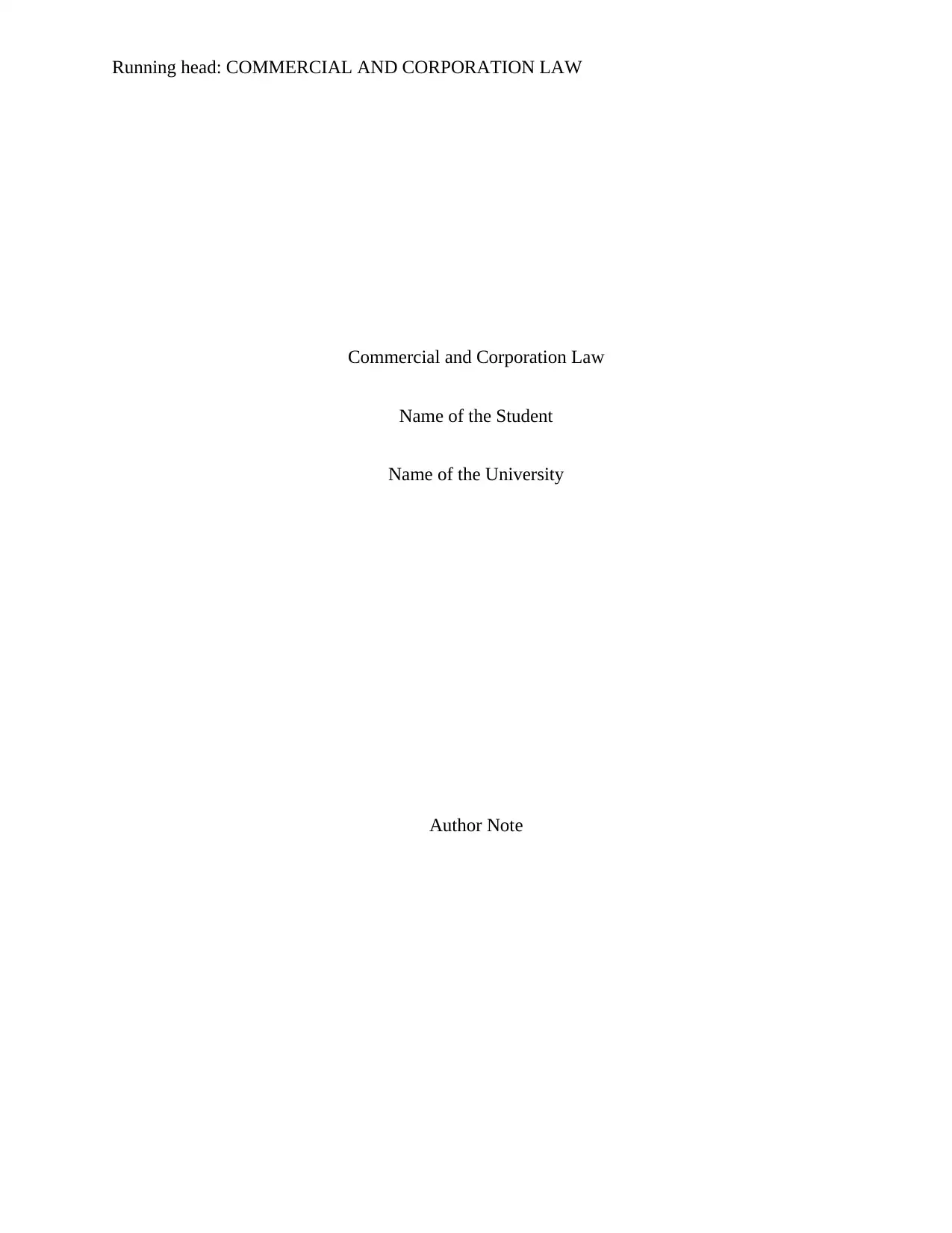
Running head: COMMERCIAL AND CORPORATION LAW
Commercial and Corporation Law
Name of the Student
Name of the University
Author Note
Commercial and Corporation Law
Name of the Student
Name of the University
Author Note
Paraphrase This Document
Need a fresh take? Get an instant paraphrase of this document with our AI Paraphraser
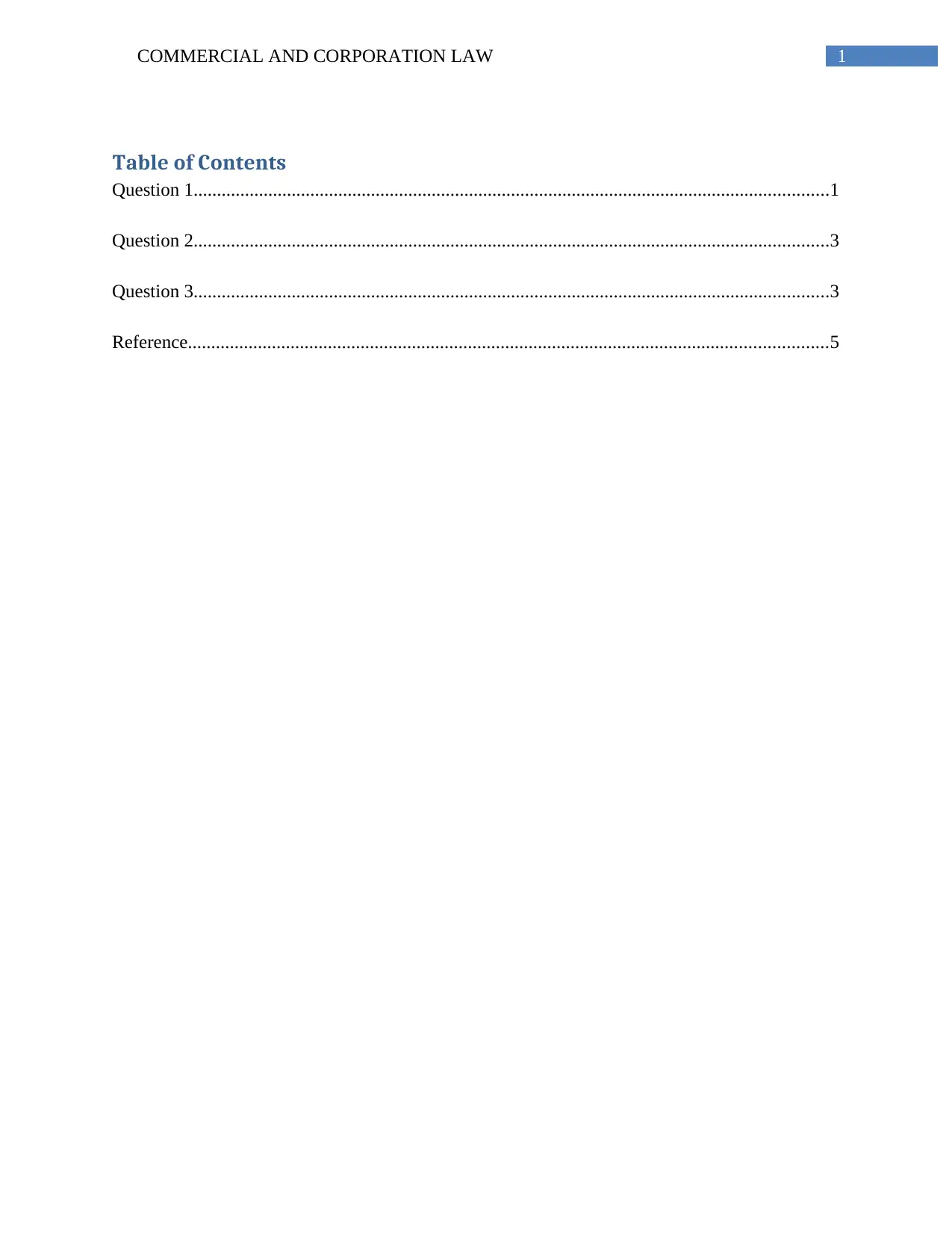
1COMMERCIAL AND CORPORATION LAW
Table of Contents
Question 1........................................................................................................................................1
Question 2........................................................................................................................................3
Question 3........................................................................................................................................3
Reference.........................................................................................................................................5
Table of Contents
Question 1........................................................................................................................................1
Question 2........................................................................................................................................3
Question 3........................................................................................................................................3
Reference.........................................................................................................................................5
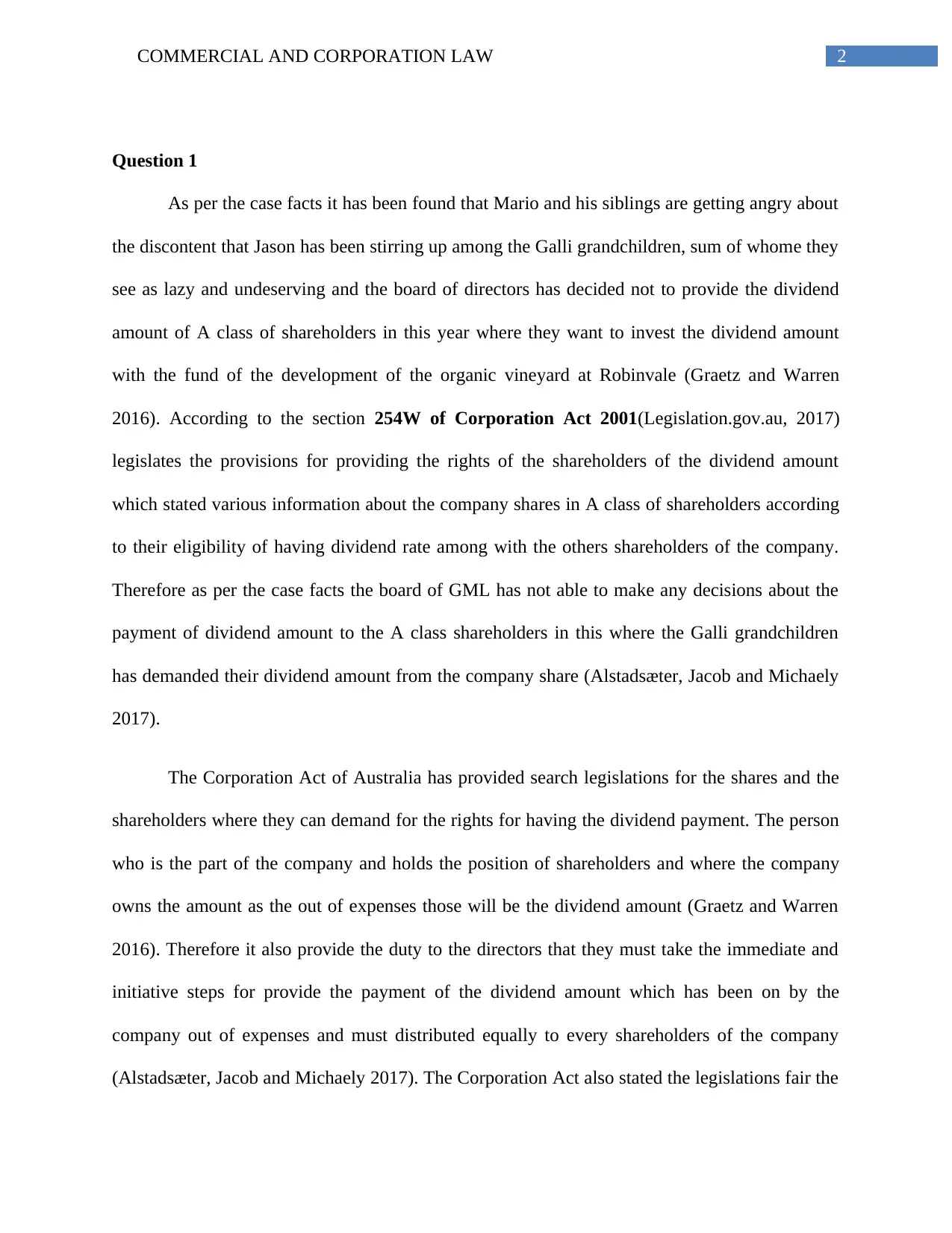
2COMMERCIAL AND CORPORATION LAW
Question 1
As per the case facts it has been found that Mario and his siblings are getting angry about
the discontent that Jason has been stirring up among the Galli grandchildren, sum of whome they
see as lazy and undeserving and the board of directors has decided not to provide the dividend
amount of A class of shareholders in this year where they want to invest the dividend amount
with the fund of the development of the organic vineyard at Robinvale (Graetz and Warren
2016). According to the section 254W of Corporation Act 2001(Legislation.gov.au, 2017)
legislates the provisions for providing the rights of the shareholders of the dividend amount
which stated various information about the company shares in A class of shareholders according
to their eligibility of having dividend rate among with the others shareholders of the company.
Therefore as per the case facts the board of GML has not able to make any decisions about the
payment of dividend amount to the A class shareholders in this where the Galli grandchildren
has demanded their dividend amount from the company share (Alstadsæter, Jacob and Michaely
2017).
The Corporation Act of Australia has provided search legislations for the shares and the
shareholders where they can demand for the rights for having the dividend payment. The person
who is the part of the company and holds the position of shareholders and where the company
owns the amount as the out of expenses those will be the dividend amount (Graetz and Warren
2016). Therefore it also provide the duty to the directors that they must take the immediate and
initiative steps for provide the payment of the dividend amount which has been on by the
company out of expenses and must distributed equally to every shareholders of the company
(Alstadsæter, Jacob and Michaely 2017). The Corporation Act also stated the legislations fair the
Question 1
As per the case facts it has been found that Mario and his siblings are getting angry about
the discontent that Jason has been stirring up among the Galli grandchildren, sum of whome they
see as lazy and undeserving and the board of directors has decided not to provide the dividend
amount of A class of shareholders in this year where they want to invest the dividend amount
with the fund of the development of the organic vineyard at Robinvale (Graetz and Warren
2016). According to the section 254W of Corporation Act 2001(Legislation.gov.au, 2017)
legislates the provisions for providing the rights of the shareholders of the dividend amount
which stated various information about the company shares in A class of shareholders according
to their eligibility of having dividend rate among with the others shareholders of the company.
Therefore as per the case facts the board of GML has not able to make any decisions about the
payment of dividend amount to the A class shareholders in this where the Galli grandchildren
has demanded their dividend amount from the company share (Alstadsæter, Jacob and Michaely
2017).
The Corporation Act of Australia has provided search legislations for the shares and the
shareholders where they can demand for the rights for having the dividend payment. The person
who is the part of the company and holds the position of shareholders and where the company
owns the amount as the out of expenses those will be the dividend amount (Graetz and Warren
2016). Therefore it also provide the duty to the directors that they must take the immediate and
initiative steps for provide the payment of the dividend amount which has been on by the
company out of expenses and must distributed equally to every shareholders of the company
(Alstadsæter, Jacob and Michaely 2017). The Corporation Act also stated the legislations fair the
⊘ This is a preview!⊘
Do you want full access?
Subscribe today to unlock all pages.

Trusted by 1+ million students worldwide
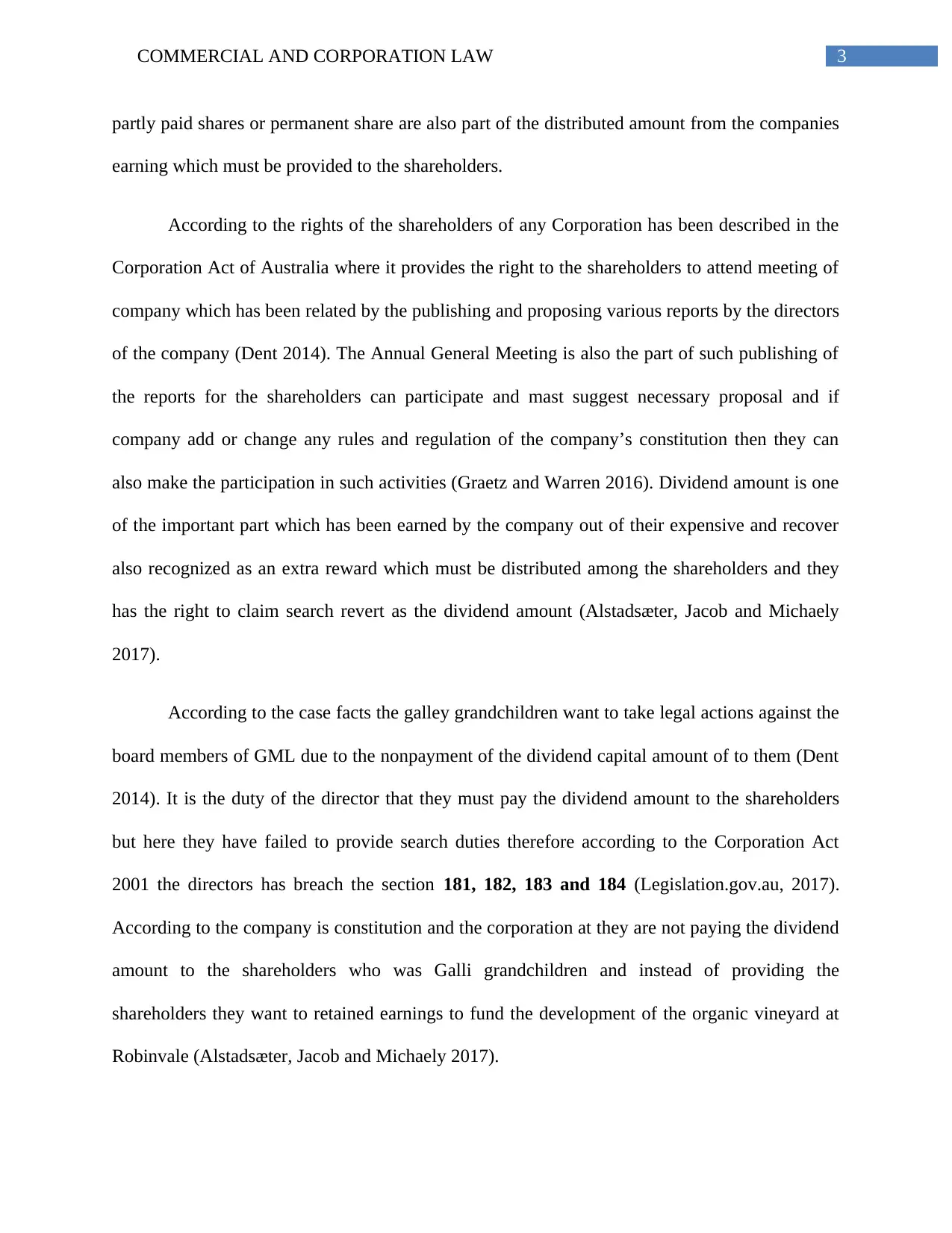
3COMMERCIAL AND CORPORATION LAW
partly paid shares or permanent share are also part of the distributed amount from the companies
earning which must be provided to the shareholders.
According to the rights of the shareholders of any Corporation has been described in the
Corporation Act of Australia where it provides the right to the shareholders to attend meeting of
company which has been related by the publishing and proposing various reports by the directors
of the company (Dent 2014). The Annual General Meeting is also the part of such publishing of
the reports for the shareholders can participate and mast suggest necessary proposal and if
company add or change any rules and regulation of the company’s constitution then they can
also make the participation in such activities (Graetz and Warren 2016). Dividend amount is one
of the important part which has been earned by the company out of their expensive and recover
also recognized as an extra reward which must be distributed among the shareholders and they
has the right to claim search revert as the dividend amount (Alstadsæter, Jacob and Michaely
2017).
According to the case facts the galley grandchildren want to take legal actions against the
board members of GML due to the nonpayment of the dividend capital amount of to them (Dent
2014). It is the duty of the director that they must pay the dividend amount to the shareholders
but here they have failed to provide search duties therefore according to the Corporation Act
2001 the directors has breach the section 181, 182, 183 and 184 (Legislation.gov.au, 2017).
According to the company is constitution and the corporation at they are not paying the dividend
amount to the shareholders who was Galli grandchildren and instead of providing the
shareholders they want to retained earnings to fund the development of the organic vineyard at
Robinvale (Alstadsæter, Jacob and Michaely 2017).
partly paid shares or permanent share are also part of the distributed amount from the companies
earning which must be provided to the shareholders.
According to the rights of the shareholders of any Corporation has been described in the
Corporation Act of Australia where it provides the right to the shareholders to attend meeting of
company which has been related by the publishing and proposing various reports by the directors
of the company (Dent 2014). The Annual General Meeting is also the part of such publishing of
the reports for the shareholders can participate and mast suggest necessary proposal and if
company add or change any rules and regulation of the company’s constitution then they can
also make the participation in such activities (Graetz and Warren 2016). Dividend amount is one
of the important part which has been earned by the company out of their expensive and recover
also recognized as an extra reward which must be distributed among the shareholders and they
has the right to claim search revert as the dividend amount (Alstadsæter, Jacob and Michaely
2017).
According to the case facts the galley grandchildren want to take legal actions against the
board members of GML due to the nonpayment of the dividend capital amount of to them (Dent
2014). It is the duty of the director that they must pay the dividend amount to the shareholders
but here they have failed to provide search duties therefore according to the Corporation Act
2001 the directors has breach the section 181, 182, 183 and 184 (Legislation.gov.au, 2017).
According to the company is constitution and the corporation at they are not paying the dividend
amount to the shareholders who was Galli grandchildren and instead of providing the
shareholders they want to retained earnings to fund the development of the organic vineyard at
Robinvale (Alstadsæter, Jacob and Michaely 2017).
Paraphrase This Document
Need a fresh take? Get an instant paraphrase of this document with our AI Paraphraser
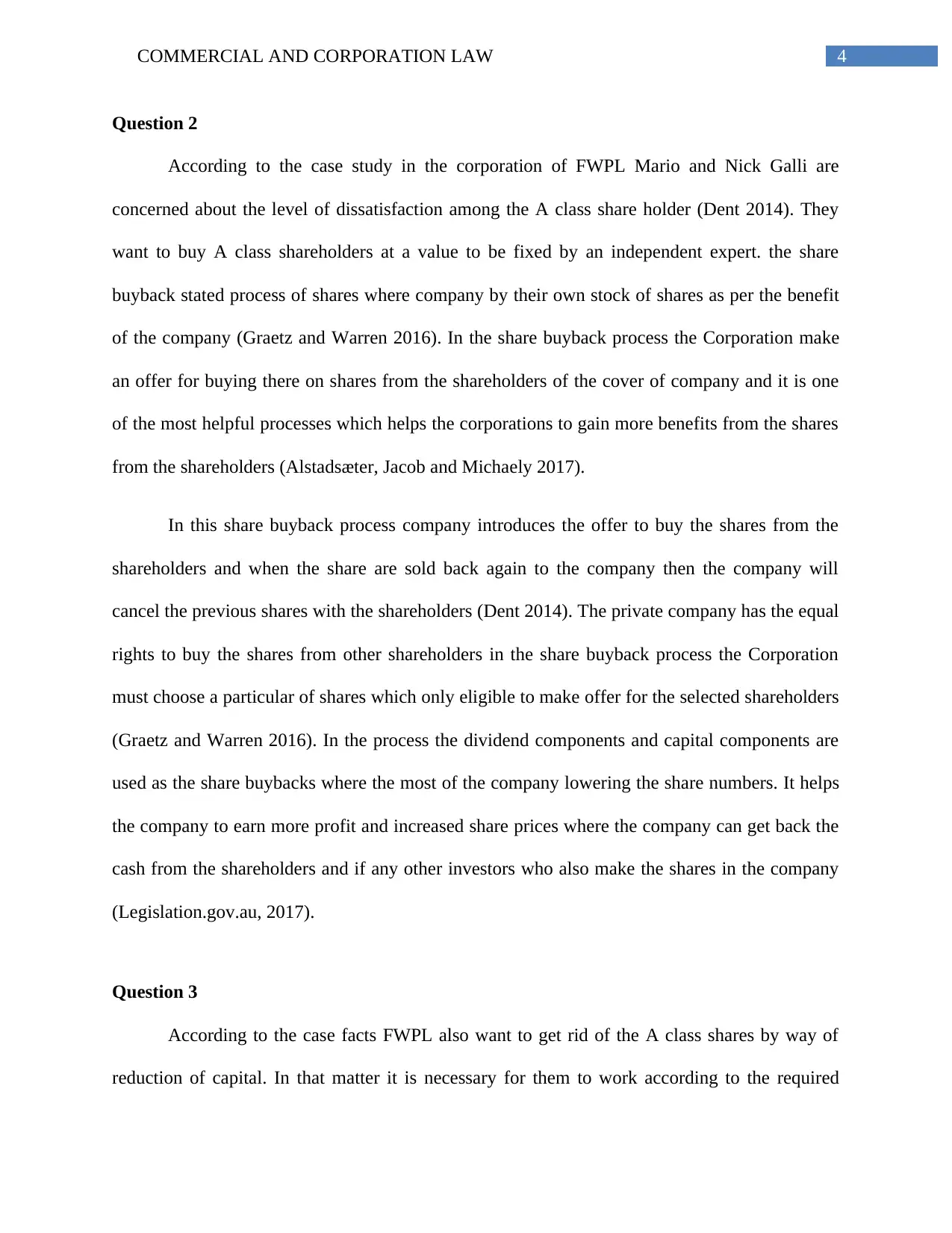
4COMMERCIAL AND CORPORATION LAW
Question 2
According to the case study in the corporation of FWPL Mario and Nick Galli are
concerned about the level of dissatisfaction among the A class share holder (Dent 2014). They
want to buy A class shareholders at a value to be fixed by an independent expert. the share
buyback stated process of shares where company by their own stock of shares as per the benefit
of the company (Graetz and Warren 2016). In the share buyback process the Corporation make
an offer for buying there on shares from the shareholders of the cover of company and it is one
of the most helpful processes which helps the corporations to gain more benefits from the shares
from the shareholders (Alstadsæter, Jacob and Michaely 2017).
In this share buyback process company introduces the offer to buy the shares from the
shareholders and when the share are sold back again to the company then the company will
cancel the previous shares with the shareholders (Dent 2014). The private company has the equal
rights to buy the shares from other shareholders in the share buyback process the Corporation
must choose a particular of shares which only eligible to make offer for the selected shareholders
(Graetz and Warren 2016). In the process the dividend components and capital components are
used as the share buybacks where the most of the company lowering the share numbers. It helps
the company to earn more profit and increased share prices where the company can get back the
cash from the shareholders and if any other investors who also make the shares in the company
(Legislation.gov.au, 2017).
Question 3
According to the case facts FWPL also want to get rid of the A class shares by way of
reduction of capital. In that matter it is necessary for them to work according to the required
Question 2
According to the case study in the corporation of FWPL Mario and Nick Galli are
concerned about the level of dissatisfaction among the A class share holder (Dent 2014). They
want to buy A class shareholders at a value to be fixed by an independent expert. the share
buyback stated process of shares where company by their own stock of shares as per the benefit
of the company (Graetz and Warren 2016). In the share buyback process the Corporation make
an offer for buying there on shares from the shareholders of the cover of company and it is one
of the most helpful processes which helps the corporations to gain more benefits from the shares
from the shareholders (Alstadsæter, Jacob and Michaely 2017).
In this share buyback process company introduces the offer to buy the shares from the
shareholders and when the share are sold back again to the company then the company will
cancel the previous shares with the shareholders (Dent 2014). The private company has the equal
rights to buy the shares from other shareholders in the share buyback process the Corporation
must choose a particular of shares which only eligible to make offer for the selected shareholders
(Graetz and Warren 2016). In the process the dividend components and capital components are
used as the share buybacks where the most of the company lowering the share numbers. It helps
the company to earn more profit and increased share prices where the company can get back the
cash from the shareholders and if any other investors who also make the shares in the company
(Legislation.gov.au, 2017).
Question 3
According to the case facts FWPL also want to get rid of the A class shares by way of
reduction of capital. In that matter it is necessary for them to work according to the required
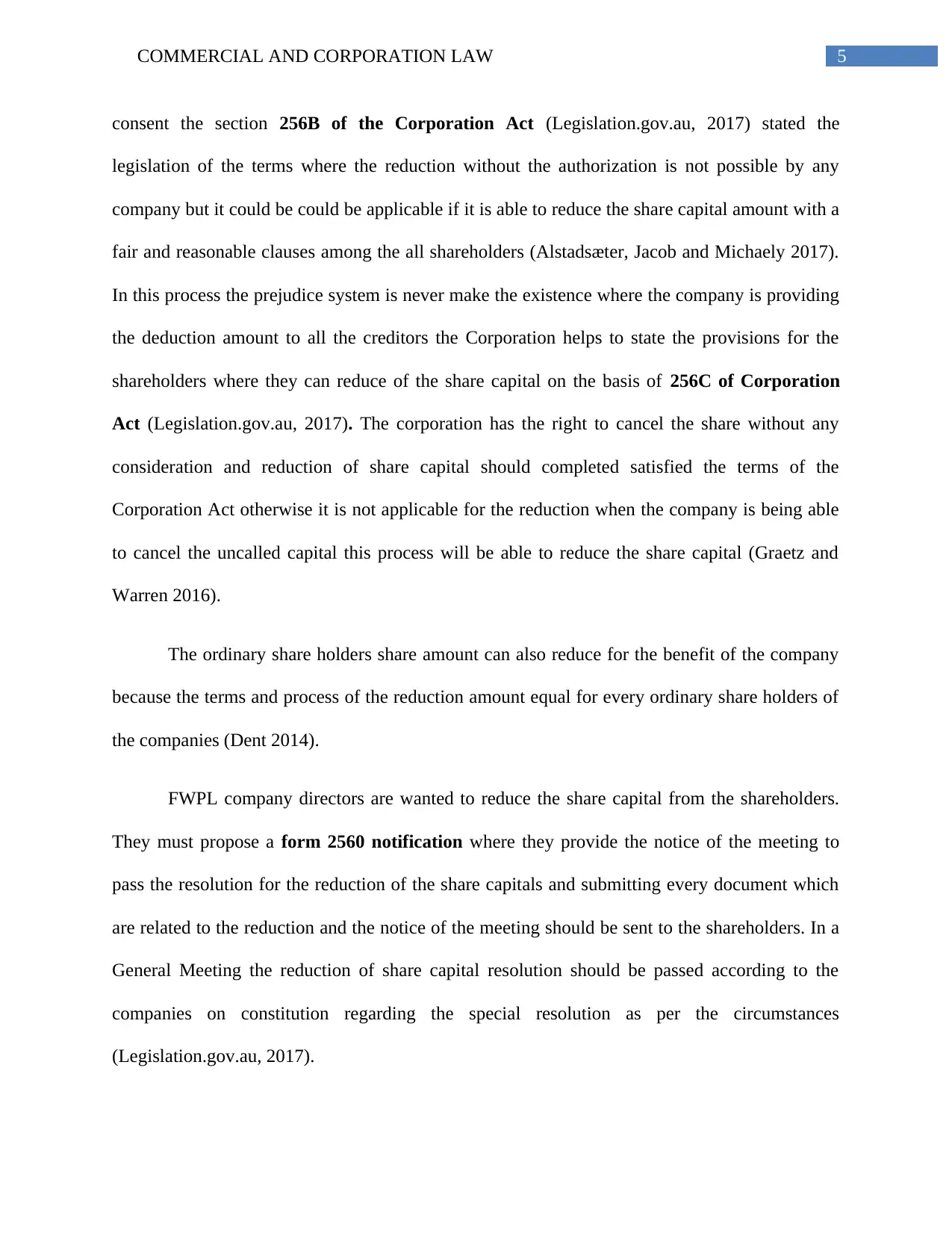
5COMMERCIAL AND CORPORATION LAW
consent the section 256B of the Corporation Act (Legislation.gov.au, 2017) stated the
legislation of the terms where the reduction without the authorization is not possible by any
company but it could be could be applicable if it is able to reduce the share capital amount with a
fair and reasonable clauses among the all shareholders (Alstadsæter, Jacob and Michaely 2017).
In this process the prejudice system is never make the existence where the company is providing
the deduction amount to all the creditors the Corporation helps to state the provisions for the
shareholders where they can reduce of the share capital on the basis of 256C of Corporation
Act (Legislation.gov.au, 2017). The corporation has the right to cancel the share without any
consideration and reduction of share capital should completed satisfied the terms of the
Corporation Act otherwise it is not applicable for the reduction when the company is being able
to cancel the uncalled capital this process will be able to reduce the share capital (Graetz and
Warren 2016).
The ordinary share holders share amount can also reduce for the benefit of the company
because the terms and process of the reduction amount equal for every ordinary share holders of
the companies (Dent 2014).
FWPL company directors are wanted to reduce the share capital from the shareholders.
They must propose a form 2560 notification where they provide the notice of the meeting to
pass the resolution for the reduction of the share capitals and submitting every document which
are related to the reduction and the notice of the meeting should be sent to the shareholders. In a
General Meeting the reduction of share capital resolution should be passed according to the
companies on constitution regarding the special resolution as per the circumstances
(Legislation.gov.au, 2017).
consent the section 256B of the Corporation Act (Legislation.gov.au, 2017) stated the
legislation of the terms where the reduction without the authorization is not possible by any
company but it could be could be applicable if it is able to reduce the share capital amount with a
fair and reasonable clauses among the all shareholders (Alstadsæter, Jacob and Michaely 2017).
In this process the prejudice system is never make the existence where the company is providing
the deduction amount to all the creditors the Corporation helps to state the provisions for the
shareholders where they can reduce of the share capital on the basis of 256C of Corporation
Act (Legislation.gov.au, 2017). The corporation has the right to cancel the share without any
consideration and reduction of share capital should completed satisfied the terms of the
Corporation Act otherwise it is not applicable for the reduction when the company is being able
to cancel the uncalled capital this process will be able to reduce the share capital (Graetz and
Warren 2016).
The ordinary share holders share amount can also reduce for the benefit of the company
because the terms and process of the reduction amount equal for every ordinary share holders of
the companies (Dent 2014).
FWPL company directors are wanted to reduce the share capital from the shareholders.
They must propose a form 2560 notification where they provide the notice of the meeting to
pass the resolution for the reduction of the share capitals and submitting every document which
are related to the reduction and the notice of the meeting should be sent to the shareholders. In a
General Meeting the reduction of share capital resolution should be passed according to the
companies on constitution regarding the special resolution as per the circumstances
(Legislation.gov.au, 2017).
⊘ This is a preview!⊘
Do you want full access?
Subscribe today to unlock all pages.

Trusted by 1+ million students worldwide
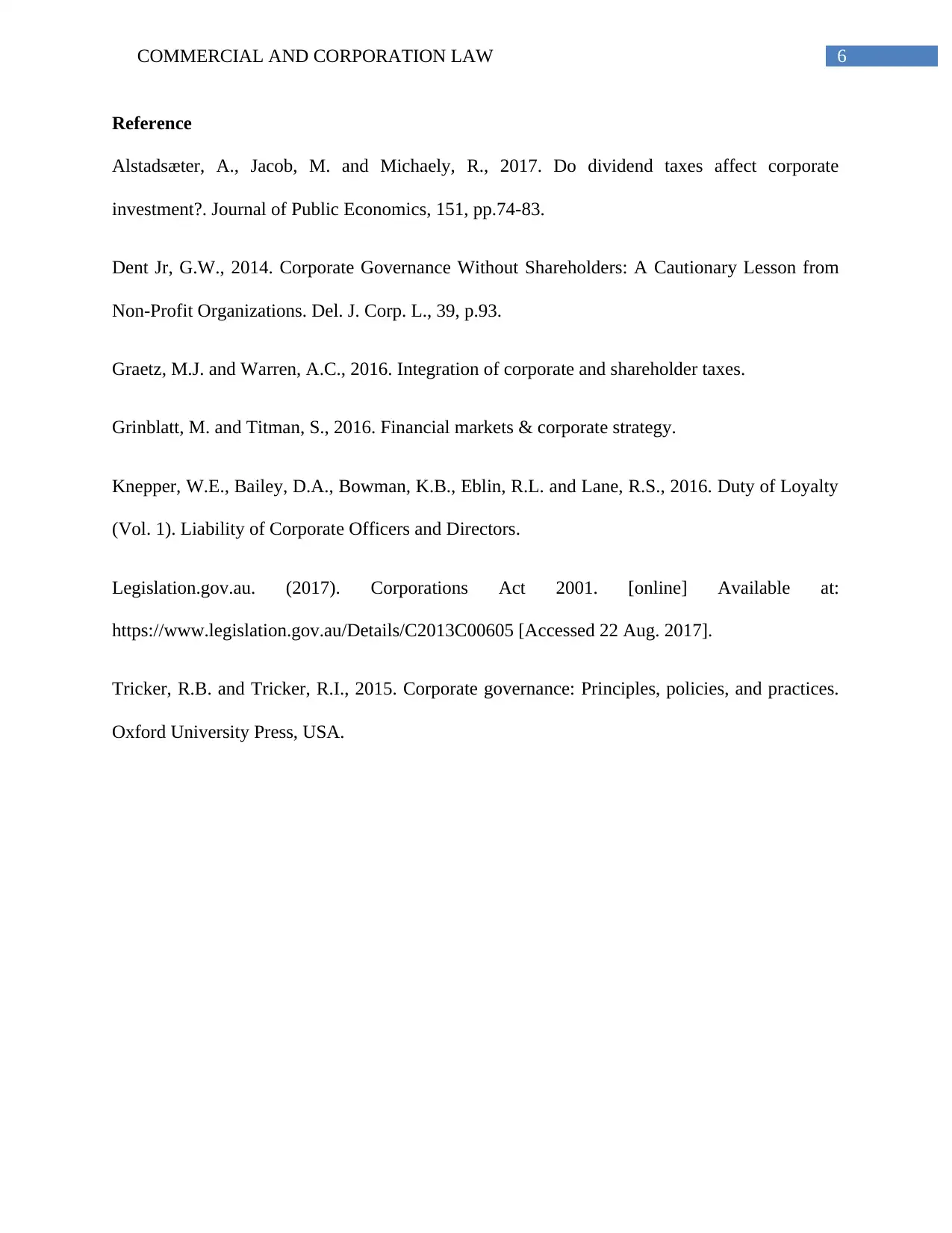
6COMMERCIAL AND CORPORATION LAW
Reference
Alstadsæter, A., Jacob, M. and Michaely, R., 2017. Do dividend taxes affect corporate
investment?. Journal of Public Economics, 151, pp.74-83.
Dent Jr, G.W., 2014. Corporate Governance Without Shareholders: A Cautionary Lesson from
Non-Profit Organizations. Del. J. Corp. L., 39, p.93.
Graetz, M.J. and Warren, A.C., 2016. Integration of corporate and shareholder taxes.
Grinblatt, M. and Titman, S., 2016. Financial markets & corporate strategy.
Knepper, W.E., Bailey, D.A., Bowman, K.B., Eblin, R.L. and Lane, R.S., 2016. Duty of Loyalty
(Vol. 1). Liability of Corporate Officers and Directors.
Legislation.gov.au. (2017). Corporations Act 2001. [online] Available at:
https://www.legislation.gov.au/Details/C2013C00605 [Accessed 22 Aug. 2017].
Tricker, R.B. and Tricker, R.I., 2015. Corporate governance: Principles, policies, and practices.
Oxford University Press, USA.
Reference
Alstadsæter, A., Jacob, M. and Michaely, R., 2017. Do dividend taxes affect corporate
investment?. Journal of Public Economics, 151, pp.74-83.
Dent Jr, G.W., 2014. Corporate Governance Without Shareholders: A Cautionary Lesson from
Non-Profit Organizations. Del. J. Corp. L., 39, p.93.
Graetz, M.J. and Warren, A.C., 2016. Integration of corporate and shareholder taxes.
Grinblatt, M. and Titman, S., 2016. Financial markets & corporate strategy.
Knepper, W.E., Bailey, D.A., Bowman, K.B., Eblin, R.L. and Lane, R.S., 2016. Duty of Loyalty
(Vol. 1). Liability of Corporate Officers and Directors.
Legislation.gov.au. (2017). Corporations Act 2001. [online] Available at:
https://www.legislation.gov.au/Details/C2013C00605 [Accessed 22 Aug. 2017].
Tricker, R.B. and Tricker, R.I., 2015. Corporate governance: Principles, policies, and practices.
Oxford University Press, USA.
1 out of 7
Related Documents
Your All-in-One AI-Powered Toolkit for Academic Success.
+13062052269
info@desklib.com
Available 24*7 on WhatsApp / Email
![[object Object]](/_next/static/media/star-bottom.7253800d.svg)
Unlock your academic potential
Copyright © 2020–2025 A2Z Services. All Rights Reserved. Developed and managed by ZUCOL.





